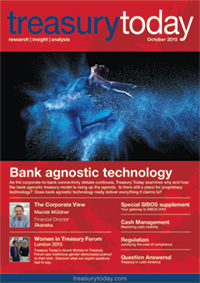Contents
- Editorial
- Control the ball and you control the game
- Question Answered
- Question Answered: Treasury in Latin America
- Market View
- More volatile markets on the horizon
- Women in Treasury
- Ringing the changes
- Special Feature: Thomson Reuters
- Future-proofing the treasury department in an uncertain world
- Insight & Analysis
- Commitment issues
- The Bigger Picture
- Janet Yellen: a straight arrow
- The Corporate View
- Corporate View: Maciek Müldner, Skanska
- Regulation
- Justifying the cost of compliance
- Cash Management
- Show me the money
Editorial
Control the ball and you control the game
Having just returned from the EuroFinance International Cash and Treasury Management conference in Copenhagen, it is perhaps worth reflecting on some of the key themes that emerged. The focus of this year’s event was fitness; keeping your treasury function fit for purpose, fit for growth and fit for the future. These themes were addressed on consecutive days under the banners of flexibility, strength and speed, and sustainability.
A variety of speakers presented on best practices, as well as topics such as the rise of FinTech, coping with volatility, and how to navigate the future against a backdrop of uncertainty, to name but a few. Greece’s near Eurozone exit, the possibility of a ‘Brexit’, the stock market fall and growth downturn in China, commodities and oil price volatility, the migration crisis and low interest rate environment were also hotly debated. On the subject of a possible ‘Brexit’, José Manuel Barroso ex-European Commission President commented: “It’d be very negative if the UK leaves…indeed, it’d be a disaster for Europe. I hope it [UK exit] won’t happen, I have fundamental trust in the wisdom of British people and I believe they won’t vote against their interests. Britain will lose if it does leave the EU as it is the biggest trading bloc in the world – representing 25% of global output.” Perhaps many of you are already running impact analysis scenarios on the possibility of this happening.
Lord Stuart Rose, former CEO and Chairman of Marks & Spencer, now at Ocado, spoke about how treasury used to be viewed as a service function but is now regarded as absolutely central to a business. “Finance should be at the centre of initiatives and no CEO worth his (or her) salt should forget this,” he said.
We also heard Rupert Pennant-Rea, former Deputy Governor of the Bank of England, share his thoughts on why the view that India will replace China as the next major emerging market is simply not true. India is not as big as China in economic terms (India is $2trn versus China $11trn), India has a smaller percentage of its GDP from the manufacturing sector and India has no immediate infrastructure growth whereas in China such projects “just happen,” he explained.
After the various bank-led client events had concluded on the evening of the opening day, delegates arrived fresh and early on day two to hear about mind-set, nutrition, movement and recovery, again reinforcing the fitness theme. Finally, delegates heard from former Game Changer at global sports brand Nike on the linkages between sports science principles and business leadership. “I believe every organisation needs to learn to look after the ‘ball’. In business the ‘ball’ could be big data,” suggested Dr Erez Morag, CEO and Founder of Acceler8 Performance Ltd.
Treasury fitness, in his view, is all about understanding the details of the game: the processes, the moving parts, the connections. And having worked with some of the most successful sportspeople on the planet, there is clearly a great deal of value in Dr Morag’s beliefs.
Perhaps the big challenge for you is identifying what the ‘ball’ is in your treasury organisation, where it is, and how to keep control of it.


